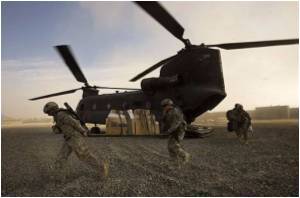
A dog handler throws balls and around a dozen puppies streak off in hot pursuit. The dogs catch the balls and proudly fetch them.
But it is not a game -- it is the first step in an 18-month training programme that will transform the dogs into highly skilled mine detectors.
They will then help to save lives in a country where thousands of people have been killed by old landmines and improvised explosive devices (IEDs) used by Taliban insurgents.
"Using dogs in Afghanistan, which is one of the most heavily-mined countries in the world, is a very efficient way to detect mines," MDC's training manager Abdul Jabar Baser told AFP.
"Dogs can find mines faster than humans. Dogs can also find explosives around 13 centimetres (five inches) deep in soil. They can find plastic land mines that cannot be discovered by metal detectors."
Advertisement
"The dogs can learn anything you teach them," Baser said.
Advertisement
The militants use as bombs unused artillery shells, explosives in containers such as pressure cookers and devices made from the common fertilizer, ammonium nitrate.
"The mines are made in different countries such as Pakistan, Italy, Russia, China and Iran. There are also NATO's unexploded ordnance that we collect," Baser said.
The US-led NATO force has more than 100,000 troops in Afghanistan, but combat soldiers will withdraw by the end of 2014 and hand responsibility for security to Afghan forces.
According to a recent UN report, in the first six months of 2012, 1,145 Afghan civilians were killed and around 2,000 were wounded, mostly by roadside bombs.
Women and children accounted for about 30 percent of this year's casualties.
NATO's International Security Assistance Force (ISAF) says around 1,800 IED attacks were executed between July and September alone.
"The mines and IEDs still hit between 20 and 30 people daily in different parts of the country," MDC's operations manager Shah Wali Ayubi said.
"There are still a lot of insecure areas where our teams cannot go... we only clear the abandoned IEDs in some parts of the country. We can only have access to those areas after the fighting ends there," he said.
There are more than a dozen organisations and contractors and around 13,000 deminers working to eliminate forgotten mines in Afghanistan.
The MDC also uses heavy machinery and human deminers but dogs are treasured for their powerful sense of smell, and dog teams can clear an area six times faster than humans.
"The best thing about this dog is that he can clear the minefield. Those mines which cannot be identified by machines, the dogs can smell them and find them," trainer Nabiullah said while working with his dog.
The centre, which also trains dogs for the police and army, mostly uses German shepherds and Belgian malinois dogs.
"In northern parts of the country there are old mines, but in southern parts of the country there are more IEDs and newly planted mines," Baser said.
At the centre, the dogs are trained to walk and search for explosives in straight lines. When the dog finds the explosives, it sits, looks at its handler and waits until given the command to return.
The proud dog then gets a ball as a reward and plays while the deminer team marks the spot and removes or detonates the mine.
"We test them every morning, we trust them 100 percent whenever they work. If a dog doesn't work well during training, then we don't use that dog that day but replace it with another one," deminer Mohammad Daud said.
Deminer dogs can work an average of eight years before they retire, when they are sometimes given away as pets.
Funded by international partners, the dog handlers and demining teams are all Afghans.
Since 1989, when the Soviets withdrew after a 10-year occupation, nearly 700,000 mines and more than 15 million explosive left-overs from decades of war have been destroyed, according to United Nations figures.
Source-AFP









